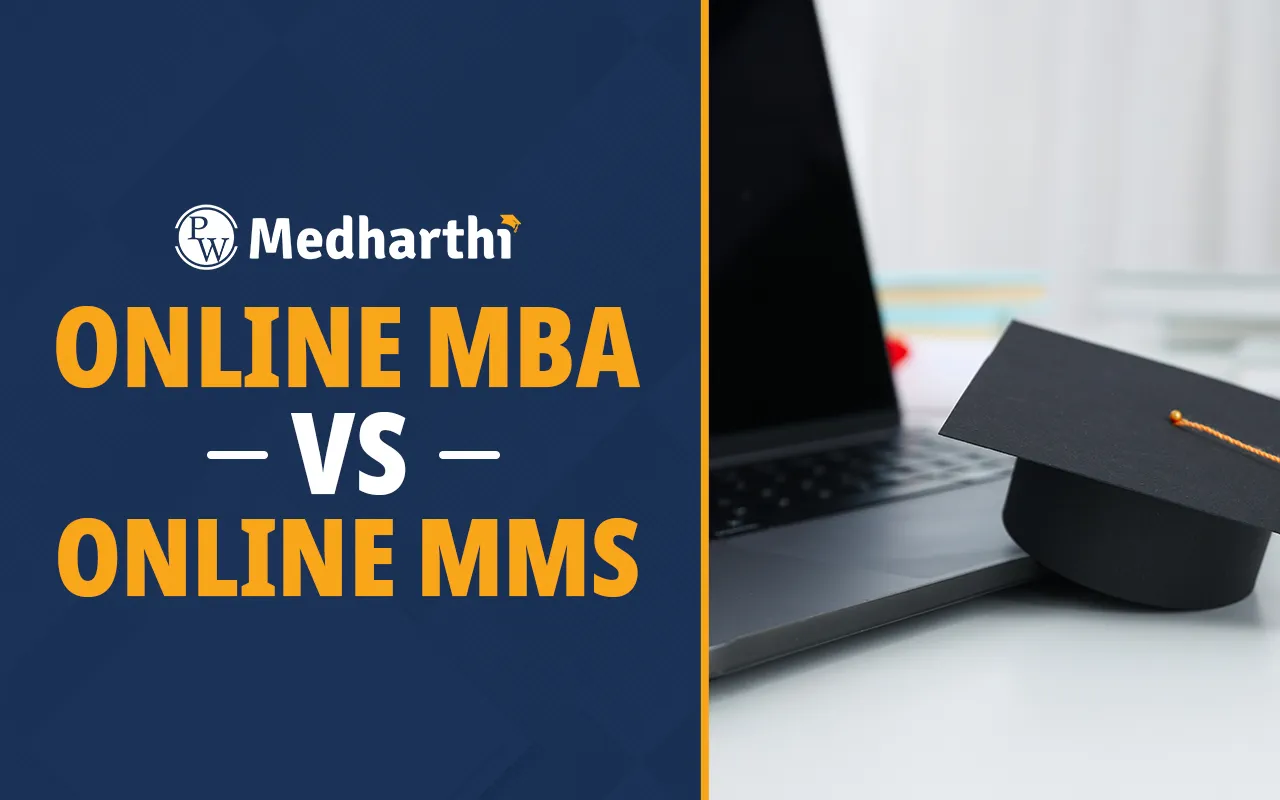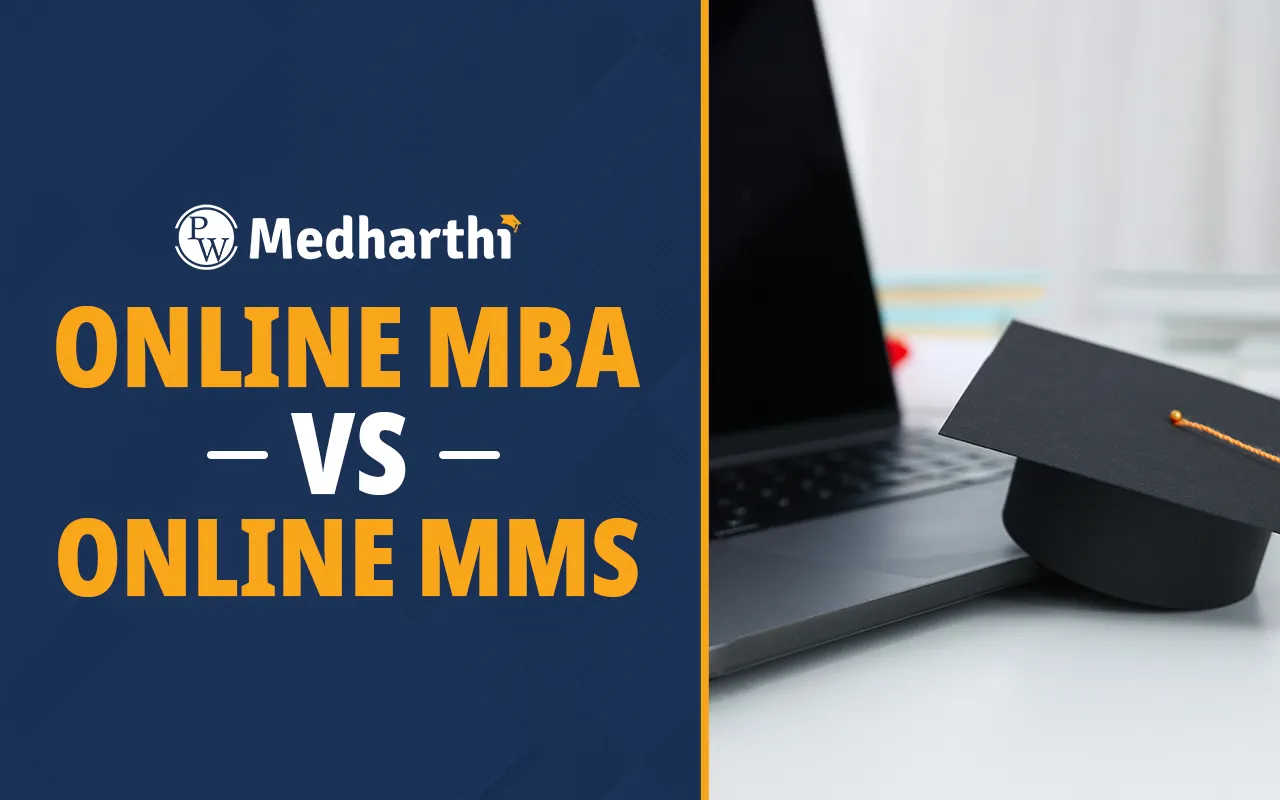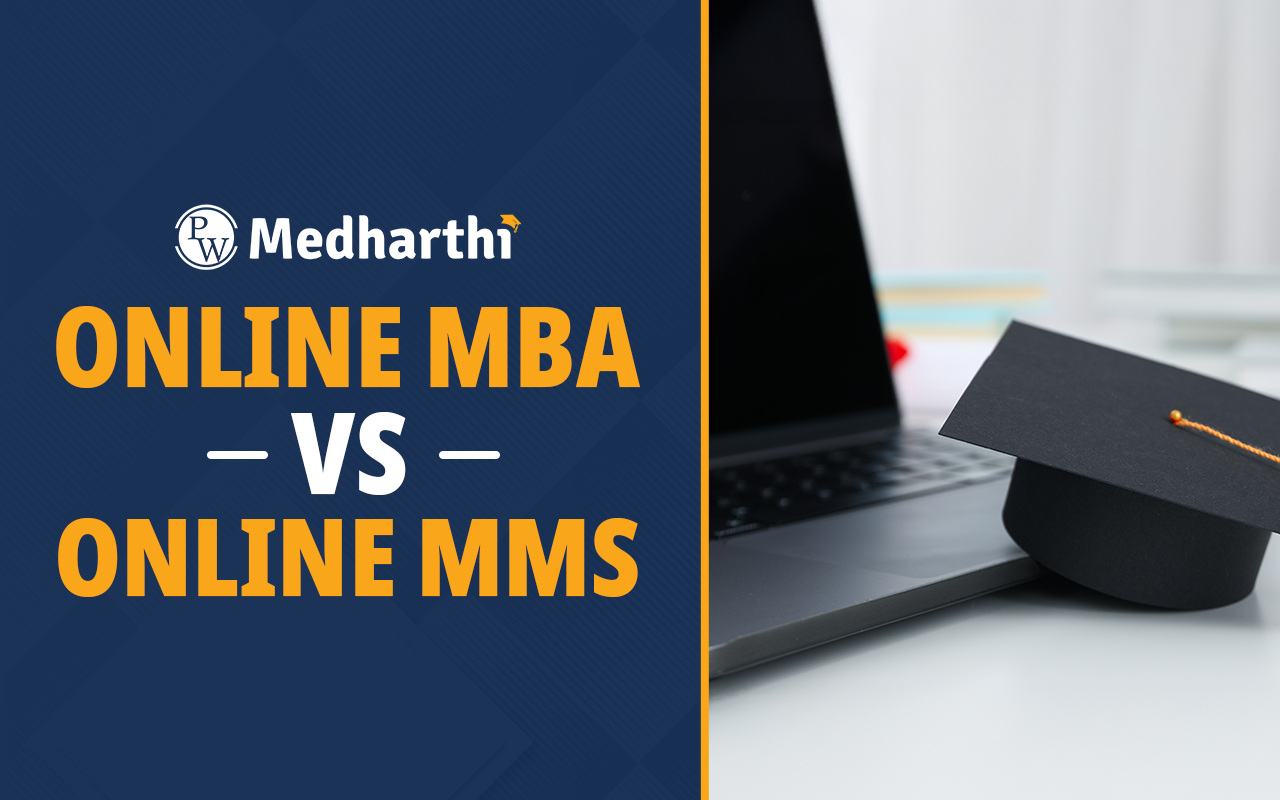

Online MBA vs Online MMS becomes a major question of comparison for aspirants who want to pursue management PG education. Both postgraduate programmes aim to develop leadership and analytical abilities. However, career scope and outcomes after completing both courses can differ considerably.
An MBA degree is known for its global perspective, preparing students for leadership roles across industries. On the contrary, an MMS degree is rooted in the Indian academic framework, focusing on practical management knowledge aligned with local industry needs. Understanding these differences is important for candidates who are planning their next step in higher education in the management sector. Further, selecting the right programme requires balancing global recognition, career aspirations, financial investment, and long-term professional goals.
Overview of Online MBA and Online MMS
An overview of Online MBA and Online MMS can help candidates learn about their similarities and differences. While both are two-year management degrees, their recognition and career impact vary significantly. Candidates must note that the MBA course is widely respected internationally and integrates strategic thinking, innovation, and leadership skills.
On the other hand, an MMS course is delivered largely by Indian universities and provides a structured approach to management with more focus on functional skills and domestic business practices.
Here is the quick overview for online MBA and online MMS programmes:
|
Overview of Online MBA and Online MMS |
||
|---|---|---|
|
Particulars |
Online MMS |
|
|
Full Form |
Master of Business Administration |
Master of Management Studies |
|
Recognition |
Global |
Primarily Indian universities |
|
Orientation |
Strategic, global, leadership |
Functional, operational, domestic |
|
Duration |
2 years, flexible in online mode |
2 years |
|
Governing Body |
AICTE/UGC-approved institutions |
University-affiliated |
Note: Candidates should confirm the accreditation of the chosen institution. Candidates must note that accreditation of these management courses directly influences recognition, employability, and long-term value of the degree.
Eligibility Criteria: MBA vs MMS
Eligibility criteria for MBA and MMS degrees share similarities in various aspects. MBA programmes generally consider national and international entrance tests such as CAT, XAT, or GMAT for admission of students, while MMS admissions may rely on state-level or university-specific examinations.
Here are the common eligibility requirements that candidates are required to fulfill to take admission in MMS or MBA courses:
|
Eligibility Criteria for Online MBA and Online MMS |
||
|---|---|---|
|
Criteria |
Online MBA |
Online MMS |
|
Academic Qualification |
Bachelor’s degree in any stream |
Bachelor’s degree with at least 50% marks |
|
Entrance Exams |
CAT, MAT, XAT, GMAT, or institute-level entrance tests |
MAH-CET or university-specific entrance exams |
|
Work Experience |
Preferred by top institutes |
Not compulsory |
|
Duration |
2 years |
2 years |
Note: Institutions may offer relaxations to admission in MBA or MMS courses for reserved categories. Therefore, aspirants are encouraged to check official notifications before applying to learn about the actual relaxations.
Specialisations Offered in MBA vs MMS
Specialisations offered in MBA and MMS courses reflect the special education they will receive while pursuing these managerial courses. Further, MBA programmes generally include internationally recognised electives, while MMS courses tend to concentrate on functional areas relevant to Indian business perspectives.
Here are the specialisations offered in MBA and MMS online courses:
|
Specialisations offered in MBA vs MMS |
|
|---|---|
|
MBA Specialisations |
MMS Specialisations |
|
Marketing |
Marketing |
|
Finance |
Finance |
|
Human Resource Management |
Human Resource Development |
|
Operations |
Operations and Production |
|
Business Analytics |
Business Analytics |
|
International Business |
International Business |
Note: It is important for the candidates to select the right specialisation in their MBA or MMS course. The right specialisation can shape their career pathways in the right direction.
Career Opportunities After Online MBA
Career opportunities after an Online MBA can span multiple industries and geographical boundaries. Candidates should be aware that MBA courses are globally accepted and recognised in various sectors. This degree is great for pursuing senior management and leadership roles such as:
-
Business Development Manager
-
Management Consultant
-
Operations Director
-
Project Manager
-
International Marketing Specialist
-
Business Analyst and Data Analyst
-
Entrepreneurial and start-up ventures
Career Opportunities After Online MMS
Career opportunities after Online MMS are equally promising but often more aligned with domestic employment markets in India. MMS graduates typically begin with managerial or supervisory positions in distinguished sectors. After that, they can gain experience in their field before advancing into higher roles.
MMS graduates can become a:
-
Marketing Manager
-
Financial Analyst
-
HR Manager
-
Operations Executive
-
Corporate Trainer
-
Business Analyst
-
Administrative positions in higher education
Salary Comparison: MBA vs MMS Graduates
Salary comparison between MBA and MMS graduates reveals a clear distinction in starting packages. MBA graduates usually command higher salaries, particularly when placed in multinational organisations. Further, MMS graduates, while competitive in Indian markets, often begin with more modest packages but progress steadily with experience.
|
Salary Comparison: MBA vs MMS Graduates |
||
|---|---|---|
|
Qualification |
Average Starting Salary in India |
International Opportunities |
|
Online MBA |
₹8 to 12 LPA |
High, due to international recognition |
|
Online MMS |
₹4 to 7 LPA |
Limited, largely domestic |
Note: Salary outcomes depend heavily on the institution’s reputation, the candidate’s academic performance, and professional background.
Which is Better for You: MBA or MMS?
Which is better for you: MBA or MMS depends entirely on your career objectives and resources. An MBA degree suits aspirants aiming for international exposure, leadership opportunities, and higher salaries. An MMS course, on the other hand, appeals to candidates seeking affordability, strong foundational knowledge, and a career rooted in Indian corporate environments.
Rather than a one-size-fits-all answer, the decision of choosing a business management course should reflect personal aspirations, preferred industry, and long-term ambitions. Both qualifications offer significant academic and professional value, but cater to different career trajectories.
| Other Related Links | |
| Online MBA Eligibility | Online MBA Syllabus |
| Online MBA College List | Online MBA Fees |
Online MBA vs Online MMS FAQs
What distinguishes an Online MBA from an Online MMS?
Do both programmes require work experience for admission?
Which specialisations are most popular across MBA and MMS PG programmes?
Is there a salary difference between MBA and MMS graduates?
Which qualification ensures better career growth out of an MMS and an MBA course?











